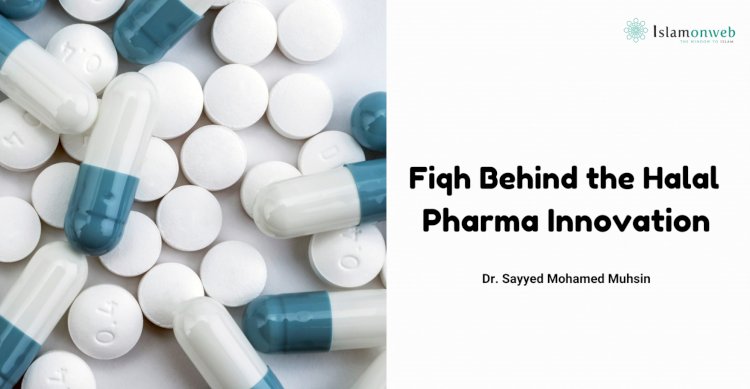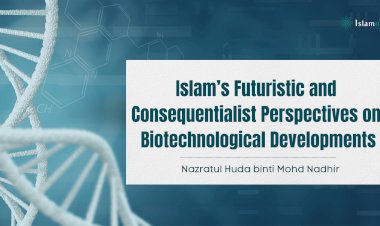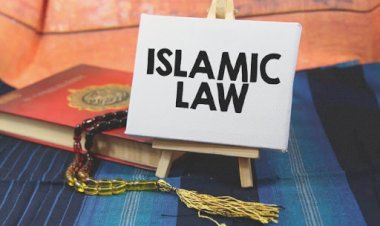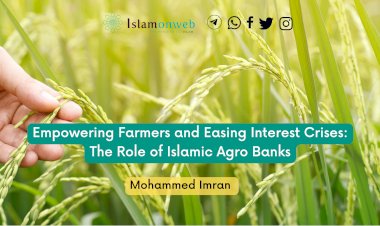Fiqh Behind the Halal Pharma Innovation
Fiqh and Medicine
Medicine and fiqh represent a union of two essential branches of knowledge. Imam al-Shafi'i is reported to have said, "Knowledge is of two kinds: knowledge of religion and knowledge of the world. Knowledge of religion is jurisprudence (fiqh), while knowledge of the world is medicine."[i]
"إِنَّمَا الْعِلْمُ عِلْمَانِ: عِلْمُ الدِّينِ، وَعِلْمُ الدُّنْيَا، فَالْعِلْمُ الَّذِي لِلدِّينِ هُوَ: الْفِقْهُ، وَالْعِلْمُ الَّذِي لِلدُّنْيَا هُوَ: الطِّبُّ."
This statement reflects the view that both serve essential functions in a balanced society. Al-Shafi'i also advised, "Do not live in a town that lacks a scholar to guide you in your faith or a doctor to inform you about your body."
"لا تَسْكُنَنَّ بَلَدًا لا يَكُونُ فِيهِ عَالِمٌ يُفْتِيكَ عَنْ دِينِكَ، وَلا طَبِيبٌ يُنْبِئُكَ عَنْ أَمْرِ بَدَنِكَ"
This highlights the necessity of religious and medical knowledge for a well-rounded life.
The objectives of Shariah (maqasid al-shariah) and medicine share common goals, both prioritizing human well-being, health, active life and productive society. Health is foundational for fulfilling the maqasid of Shariah, as it supports the preservation and promotion of din (faith) as a worldview and way of life. For instance, good health enables Muslims to observe the pillars of Islam, such as salah and hajj, effectively. Preservation of life and health (hifz al-nafs) is another primary objective, aligning closely with medicine's core purpose in healthcare and treatment. In today's context, medicine's role has expanded to address a wide range of mental, neurological, and psychiatric issues, reinforcing the protection of intellect (hifz al-aql), the third objective of maqasid. Moreover, advances in medical technology significantly contribute to the preservation of lineage (hifz al-nasl), which encompasses prenatal, delivery, and postnatal care. Finally, a healthy population is an asset to any society, forming the backbone of a thriving economy and fulfilling the fifth objective of maqasid, the preservation of wealth (hifz al-mal). Therefore, medicine not only supports Shariah's primary goals but is essential to a healthy and prosperous society.
Halal Pharmaceuticals: Why Must Medicine Be Halal?
Halal products are rapidly gaining worldwide recognition as benchmarks for safety and quality assurance. The pharmaceutical industry, which involves the production and sale of drugs and medicines, is no exception. Ensuring that medications align with halal standards is crucial for meeting the needs of Muslim consumers, particularly regarding ingredients derived from animals or substances that might be considered impure under Islamic law.
Qur'anic guidance emphasizes the consumption of lawful and good substances. Allah commands in Surah al-Baqarah, verse 168:
يَا أَيُّهَا النَّاسُ كُلُوا مِمَّا فِي الْأَرْضِ حَلَالًا طَيِّبًا وَلَا تَتَّبِعُوا خُطُوَاتِ الشَّيْطَانِ ۚ إِنَّهُ لَكُمْ عَدُوٌّ مُّبِينٌ
"O humanity! Eat from what is lawful and good on the earth and do not follow Satan’s footsteps. He is truly your sworn enemy."
This verse highlights that consuming prohibited and impure materials is akin to following the footsteps of Satan. According to Surah Al-A'raf, verse 157:
وَيُحِلُّ لَهُمُ الطَّيِّبَاتِ وَيُحَرِّمُ عَلَيْهِمُ الْخَبَائِثَ
"And He makes lawful for them the good things and prohibits for them the bad."
This underscores the importance of adhering to what is halal, as it is inherently pure, while that which is haram is deemed impure and unclean.
In a hadith narrated by Abu Hurairah (may Allah be pleased with him), the Messenger of Allah (ﷺ) stated:
"O people, indeed Allah is pure and accepts only that which is pure. And indeed Allah has commanded the believers with what He commanded the messengers, as He said: {O Messengers, eat from the good things and act righteously. Indeed, I am knowing of what you do} [Surah Al-Mu’minun: 51]. And He said: {O you who have believed, eat from the good things which We have provided for you} [Surah Al-Baqarah: 172]." Then he (peace be upon him) mentioned a man who, having traveled far, is dishevelled and dusty, and stretches out his hands to the sky saying: "O Lord, O Lord," while his food is unlawful, his drink is unlawful, his clothing is unlawful, and he has been nourished with the unlawful. So how can he be answered?" [Sahih] - [Reported by Muslim] - [Sahih Muslim - 1015] [Sahih Muslim - 1015]. This hadith emphasizes that Allah does not accept deeds, words, or beliefs except those that are pure—sincere for His sake and in accordance with the guidance of the Prophet ﷺ. Ensuring that food and medicine are halal and tayyib (pure and wholesome) is paramount for the acceptance of one’s deeds.
The Prophet ﷺ said:
“Indeed, Allah, the Most High, has sent down both illness and its cure and has made for every illness a remedy. So seek treatment, but do not seek treatment with anything unlawful” [Narrated by Abu Dawood (3874)]. This hadith underscores the importance of using lawful, permissible substances for treatment in Islam. Allah has provided cures for every disease, and believers are encouraged to seek healing while avoiding remedies that contain haram ingredients. In the context of modern pharmaceuticals, this implies that Muslims should prioritize medications free from impermissible substances, such as alcohol or pork derivatives, opting for halal-certified alternatives whenever possible. Compliance requires that all ingredients in pharmaceuticals—such as gelatin or enzymes derived from animals—must meet halal standards, ensuring that no component comes from haram sources.
Treatment with Impure Substances
The default ruling on using prohibited or impure substances for medical treatment is impermissibility, based on the general principles in Shariah that oppose such practices. The Prophet (ﷺ) explicitly prohibited the use of impure and harmful substances for healing. In Surah al-Ma'idah, Allah states:
حُرِّمَتْ عَلَيْكُمُ الْمَيْتَةُ وَالدَّمُ وَلَحْمُ الْخِنْزِيرِ وَمَا أُهِلَّ لِغَيْرِ اللَّهِ بِهِ وَالْمُنْخَنِقَةُ وَالْمَوْقُوذَةُ وَالْمُتَرَدِّيَةُ وَالنَّطِيحَةُ
“Prohibited to you are dead animals, blood, the flesh of swine, and that which has been dedicated to other than Allah, and [those animals] killed by strangling or by a violent blow or by a headlong fall or by the goring of horns.” (Surah al-Ma'idah 3)
Additionally, Allah warns:
يَا أَيُّهَا الَّذِينَ آمَنُوا إِنَّمَا الْخَمْرُ وَالْمَيْسِرُ وَالْأَنصَابُ وَالْأَزْلَامُ رِجْسٌ مِّنْ عَمَلِ الشَّيْطَانِ فَاجْتَنِبُوهُ لَعَلَّكُمْ تُفْلِحُونَ (90)
“O you who have believed, indeed, intoxicants, gambling, [sacrificing on] stone alters [to other than Allah], and divining arrows are but defilement from the work of Satan, so avoid it that you may be successful.”
Ibn al-Qayyim (may Allah have mercy on him) added, "Treating with prohibited substances is inherently flawed both by Shariah and reason. The Shariah provides explicit texts forbidding such actions. Reason also indicates that Allah only forbade these items due to their harmful nature. Unlike the prohibition imposed on the Israelites as a punishment, Allah forbade harmful things for this ummah as a form of protection. Seeking healing through them is therefore inappropriate, as they may address physical ailments but harm the heart by infusing it with impurity, thus replacing bodily illness with a more severe spiritual affliction" (Zad al-Ma’ad).
However, in the face of necessity, can prohibited materials be used? Scholars have differing views on this matter:
- Prohibition of Treatment with All Impurities: Some scholars, particularly from the Hanbali school, prohibit treatment with any impure substances due to the general evidence forbidding the use of haram items. This stance is referenced in Kashshaf al-Qina' by Mansur ibn Yunus al-Buhuti.
- Permission of Treatment with All Impurities Except Alcohol: The Hanafi and Shafi'i schools permit treatment with impurities, with the exception of alcohol. This view is supported in Al-Majmu' Sharh al-Muhadhdhab by Al-Nawawi and Fath al-Qadir by Kamal al-Din Ibn al-Humam.
- Distinction Between External and Internal Use: The Maliki school differentiates between internal (ingestion) and external use (application on the skin). They prohibit internal use but allow external treatments, such as creams. Ibn Rushd explains this in Al-Bayan wa al-Tahsil, noting that while urine is impure by consensus, it may be used to clean wounds but not consumed for treatment.[ii]
Process of Halal Certification of Medicine
In Islamic law, a medicine is certified as halal based on specific criteria to ensure it aligns with Shari'ah principles. Fiqh (Islamic jurisprudence) plays an essential role in determining the permissibility of pharmaceuticals by setting guidelines for ingredients, manufacturing, and handling in compliance with Islamic values. This approach ensures that medicines are pure and free from prohibited elements.
Key guidelines for halal certification of medicines include compliance with four main areas.
First, ingredients must exclude any haram (forbidden) substances, such as animal products from carrion, swine, or improperly slaughtered animals; intoxicants like alcohol or narcotics; human-derived ingredients not allowed by Shari'ah; and any substances contaminated with najs (impurities) like blood or bodily discharges.
Second, the medicine's production and handling must avoid contamination with najas by maintaining cleanliness in equipment, facilities, and transportation.
Third, the medicine should be safe and non-hazardous, as Shari'ah emphasizes the preservation of life and the prevention of harm.
Lastly, in cases of necessity (darurah), where no halal alternatives exist and a medicine is essential to preserve life, scholars may permit the use of otherwise impermissible substances, based on the Quranic allowance in times of severe need: "But whoever is forced by severe hunger with no inclination to sin, then indeed, Allah is Forgiving and Merciful" (Al-Maidah 5:3).
An example of this practice is MS 2424: Halal Pharmaceuticals - General guidelines, which offers a structured process for certifying medicines as halal.
Ethical Challenges in Pharmaceutical Industry
The global halal market represents a rapidly growing multi-billion dollar industry, with the halal pharmaceutical sector projected to reach an estimated USD 105 billion by 2024. Currently, most conventional medicines—except for some herbal and organic health supplements—are not halal-compliant, leaving a substantial gap in the market. This presents a unique opportunity both economically and ethically for developing halal-certified pharmaceuticals that meet the demands of Muslim consumers.
One significant challenge is misrepresentation and lack of transparency in labeling. Many pharmaceutical products contain ingredients like gelatin without clear identification of whether it is sourced from permissible (halal) or impermissible (haram) sources. Gelatin used in medicine is categorized as either Type A, derived from pigs or non-halal sources and processed with acid, or Type B, from cows or buffaloes and processed with alkaline. From a fiqh (Islamic jurisprudence) perspective, the absence of transparency can mislead consumers into unknowingly consuming haram substances, which is considered gharar (deception) and prohibited in Islam. Ethical responsibility requires that ingredients are fully disclosed, aligning with Quranic guidance against exploitation through unjust trade: “And do not consume one another's wealth unjustly” (Surah Al-Baqarah, 2:188).
Contamination during production is another ethical and legal issue. Many pharmaceuticals are produced in facilities shared with non-halal products, creating risks of contamination with haram substances such as alcohol or animal derivatives from non-halal sources. Fiqh dictates that any contamination with najas (impurities) renders a product impermissible, thus requiring companies to maintain halal integrity by avoiding cross-contamination.
Islamic law also allows for exceptions in cases of extreme necessity (darurah) when no halal alternatives are available, particularly with life-saving medications. However, tadawi/darurah (treatment/necessity) should not be an excuse for bypassing the search for permissible solutions. Fiqh principles mandate that halal alternatives be actively sought to avoid reliance on prohibited materials. This ethical balance is vital, as Islam places emphasis on preserving life without compromising religious integrity.
The global halal pharmaceutical industry also faces challenges due to inconsistent certification standards across different regions. This inconsistency can lead to confusion among consumers regarding the halal status of products. Harmonizing halal standards internationally is essential for fostering trust in the certification process, as certification bodies bear an ethical obligation to uphold rigorous Shari'ah compliance.
Finally, environmental and ethical sourcing considerations are vital as the demand for halal-certified materials rises. Islam teaches stewardship of the earth and mandates ethical treatment of animals, requiring manufacturers to source materials sustainably. For example, gelatin sources should ensure that animals are slaughtered as guided with principle of ihsan, and production practices should aim for environmental sustainability in line with Islamic principles.
[Its initial version was presented at intellectual forum, "Liqa’ Mufakkirin: Unveiling the Fiqh Behind Halal Pharma Innovations," held during its grand opening ceremony on Monday, October 14, 2024, at the Main Auditorium, IIUM Gombak]
About the author:
Dr. Sayyed Mohamed Muhsin is Assistant Professor of Islamic jurisprudence at the International Islamic University Malaysia (IIUM), Kuala Lumpur. He also serves as Editor-in-Chief of Islamonweb-English.
Reference
[i] Al-Razi, Abu Muhammad Abd al-Rahman ibn Abi Hatim. Adab al-Shafi'i wa Manaqibuhu. 1st ed. Beirut: Dar al-Kutub al-Ilmiyyah, 1424 AH / 2003 CE.
Department of Islamic Development Malaysia (JAKIM). (2020). Malaysian Halal Certification Procedure Manual-Domestic (MPHHM).
Department of Standards Malaysia. (2019). Halal pharmaceuticals-General requirements (First revision).
Farahi, A., Hadijah, S., Wan Mohd, A., &Thiruvanackan K. (2018). Capsule Shell of Pharmaceutical Products in Malaysia; The Sources and Halal Status. E-Journal on the 6thIntegration of Knowledge (WCIK 2018).
Alzeer, J. (2021). Permissible medicine and rationalization of halal pharmaceuticals. Halalsphere, 1(1), 43-52.
[ii] https://www.islamweb.net/ar/fatwa/79538/ ; https://islamqa.info/ar/answers/215281; https://islamqa.info/ar/answers/398943/
Disclaimer
The views expressed in this article are the author’s own and do not necessarily mirror Islamonweb’s editorial stance.

























Leave A Comment